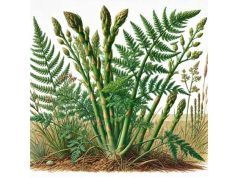
Ajowan—known scientifically as Trachyspermum ammi (and sometimes spelled “ajwain”)—is an aromatic spice treasured for its sharp, pungent flavor and extensive history within culinary and medicinal traditions, particularly across the Indian subcontinent and parts of the Middle East. The seeds, which are small, oval, and grayish-green or brown, exude a potent scent reminiscent of thyme—thanks to the primary volatile compound thymol. This strikingly intense aroma underpins Ajowan’s widespread use: as a distinctive seasoning in breads, curries, and pickles, and as a soothing remedy in folk medicine for digestive and respiratory complaints.
Steeped in centuries of usage, Ajowan has been documented in ancient Ayurvedic texts, passed down in families for remedying bloating, indigestion, and mild infections. Modern research suggests that its phytochemicals may demonstrate promising antibacterial and antifungal capacities. Beyond cuisine and home remedies, Ajowan’s essential oil is harnessed in pharmaceutical, personal care, and even agricultural settings. However, as with any potent herb, the spice demands respectful handling—overconsumption may cause irritation, and those allergic to plants in the Apiaceae family might react adversely.
- Easing indigestion, bloating, and gas due to its carminative action
- Powerful antimicrobial properties that might help guard against pathogens
- Thymol content offering strong, sharp aroma and potential anti-inflammatory benefits
- Culinary versatility in breads, spice blends, or fried snacks
- Traditional application in respiratory, oral health, and skincare remedies
Table of Contents
- Ajowan: Botanical Identity and Plant Traits
- Ajowan: Cultural Heritage and Historical Legacy
- Ajowan: Significant Phytochemicals and Chemical Composition
- Ajowan: Core Health Benefits and Noteworthy Properties
- Ajowan: Applications, Preparations, and Essential Safety Notes
- Ajowan: Major Studies and Contemporary Research Insights
- Ajowan: Frequently Asked Questions
Ajowan: Botanical Identity and Plant Traits
Taxonomic Position and Family
Ajowan (Trachyspermum ammi), sometimes placed in the genus Carum or Bishop’s weed, is classified under the Apiaceae family (also known as Umbelliferae). This plant family includes many culinary herbs like parsley, dill, coriander, fennel, and celery. These plants typically feature hollow stems and compound umbels of small flowers. Ajowan shares some morphological and chemical parallels with these well-known relatives.
Geographic Origin and Distribution
- Native Range:
Ajowan’s primary center of origin is believed to be parts of Egypt and the eastern Mediterranean, extending into southwestern Asia. Over centuries, it proliferated across the Indian subcontinent, which now stands as a major cultivator. - Cultivation Hotspots:
- India: Particularly in the states of Rajasthan and Gujarat, large fields of Ajowan produce seed for spice markets.
- Middle East and North Africa: Grown on a smaller scale, often in home gardens for local culinary use.
- Global Presence: Exported worldwide, Ajowan seeds can be found in specialty spice shops in Europe, North America, and beyond.
Botanical Characteristics
- Plant Form:
- An annual or short-lived perennial herb, typically 30–90 cm in height.
- Possesses slender, erect stems branching at the top, with leaves that are finely dissected, giving a feathery appearance.
- Flower Structures:
- Inflorescences manifest as compound umbels—flat or slightly convex clusters of tiny white or pale pink flowers.
- Each cluster yields multiple seeds upon maturation.
- Seeds (Fruits):
- What we refer to as “seeds” are technically schizocarps, splitting into two mericarps.
- Ajowan seeds are small (~2–3 mm), elliptical, ridged, and grayish-green to brown. Their strong, thyme-like aroma intensifies upon crushing.
Growth Requirements and Cultivation
- Soil Preferences: Prefers well-drained loamy soils with moderate fertility. Excessively waterlogged conditions hamper root development.
- Climate: Thrives in semi-arid to subtropical climates. While drought-tolerant, optimal seed yield arises from consistent watering during flowering and seeding phases.
- Propagation: Typically grown from seeds planted directly or started in seedbeds. Timely sowing ensures a harvest within 4–5 months of planting.
- Harvest: Once the umbels turn brownish, seeds are collected and dried, preserving flavor and volatile oils.
Ecological and Economic Value
- Pollinator Attraction:
- The umbrella of blossoms supports diverse pollinators, including bees and small flies, crucial for seed set.
- Spice Industry Commodity:
- In India, the seeds form part of significant spice export business. They rank among the region’s staple seeds for local and international markets.
- Companion Plant:
- Some farmers cultivate Ajowan in rotation or near crops to harness its pest-repelling aroma, although systematic studies remain few.
Despite its relatively modest growth habit and unassuming appearance, Ajowan’s intense aroma and prized seeds shape its legacy among culinary and herbal traditions. Its successful cultivation in different climates attests to the plant’s resilience and economic relevance.
Ajowan: Cultural Heritage and Historical Legacy
Ajowan’s pungent seeds have woven themselves into the tapestry of Mediterranean, Middle Eastern, and South Asian culinary and medical traditions. From ancient trade routes to modern global cuisines, the story of Trachyspermum ammi is one of adaptation, adoption, and enduring reverence.
Ancient and Middle Eastern Roots
- Possible Egyptian/Levantine Use:
Archaeological evidence from ancient Egyptian tombs references aromatic seeds and herbs, and while direct references to Ajowan remain scarce, it is plausible that it was among the spices transported along Red Sea trade routes. - Greek and Roman Awareness:
Some historians speculate a form of Ajowan might have reached Greek apothecaries, labeled ambiguously among “cumin” or “caraway,” though precise textual evidence is elusive.
Indian Subcontinent Integration
- Ayurvedic Canon:
- Ayurvedic treatises highlight Ajowan as “Yavani” or “Ajmoda,” prescribing it for gastric distress, colds, and arthritis.
- The text “Charaka Samhita” enumerates Ajowan’s uses to stimulate appetite, clear phlegm, and counter internal stagnation.
- Culinary Embrace:
- Over centuries, “ajwain” became integral to Indian cuisine—flavoring flatbreads, snacks (like pakoras or namkeens), and pickles.
- Popular in “panch phoron,” a Bengali five-spice mixture, and used as a digestive finishing spice in many households.
Middle Ages and Trade Dynamics
- Arab Influence:
Arab traders plying the spice routes introduced or popularized Ajowan in Persian and Ottoman cooking. The seeds spiced up dishes like roasted lamb, legumes, and special breads. - European Encounters:
Ajowan’s strong, thyme-like flavor possibly led to confusion with other Lamiaceae herbs. European herbal documents from the 16th–17th centuries occasionally mention “ajmood” or “ammi,” but usage was overshadowed by local thyme, caraway, or anise.
Modern Global Spread
- Colonial Era and Spice Trade:
- British, Dutch, and Portuguese expansions from the 17th to 19th centuries made Indian spices more accessible worldwide, including Ajowan.
- Although overshadowed by star spices like pepper or cardamom, Ajowan found niche appreciation in certain gastronomic corners of Europe and Africa.
- Commercial Availability Today:
- Ajowan seeds are widely available across Indian groceries globally, forming a staple part of diaspora communities’ spice racks.
- Culinary explorers increasingly experiment with it in fusion cuisines or artisanal baking.
Symbolic and Folk Beliefs
- Protection and Ritual Use:
Some Indian folk beliefs regard Ajowan as beneficial in warding off negative energies or purifying the home, occasionally fumigated in small ritual fires. - Household Remedies:
Mothers often rely on “ajwain water” or “ajwain paratha” to quell toddler colic or postpartum discomfort, embedding the spice as a generational caretaker’s ally.
Historical Mentions in Texts and Recipes
- Mughal-Era Cookbooks:
Regal kitchens included Ajowan in flavor profiles for bread or topping. Chroniclers described the spice’s ability to cut through rich ghee-based dishes. - Regional Cookbooks in Present Day:
Countless Indian, Pakistani, Iranian, and Ethiopian recipes rely on Ajowan for that distinctive warming essence—particularly in lentil soups, fish curries, and legumes.
In sum, Ajowan’s history arcs across ancient medical treatises, medieval spice caravans, and modern diaspora kitchens. The spice remains cherished for both its culinary punch and mild healing resonance, bridging old-world wisdom with new gastronomic frontiers.
Ajowan: Significant Phytochemicals and Chemical Composition
Ajowan’s robust, thyme-like smell reveals its notable content of volatile oils. These oils, rich in thymol and other compounds, shape the spice’s pungent flavor and potential health benefits. Understanding these constituents helps unravel Ajowan’s reputation in traditional therapies and modern experimental findings.
Essential Oils
- Thymol:
- Ajowan’s hallmark compound, accounting for up to 40–60% of its essential oil.
- Responsible for the characteristic sharp, herbal, and warming aroma reminiscent of thyme.
- Exhibits antimicrobial, antifungal, and antioxidant properties, widely studied in both culinary preservation and potential medicinal applications.
- p-Cymene and γ-Terpinene:
- Terpenic components offering subtle citrus or woody undertones.
- Often appear in synergy with thymol, contributing to Ajowan’s overall protective and flavor complexities.
- α-Pinene and β-Pinene:
- Monoterpenes that can lend fresh, pine-like nuances.
- May further enhance the plant’s insecticidal or antibacterial capabilities.
Other Notable Compounds
- Flavonoids (Apigenin, Luteolin):
- Traces of these antioxidant flavonoids might reduce oxidative stress.
- Could complement thymol’s antimicrobial action by supporting overall cellular health.
- Tannins and Saponins:
- Minor amounts can exert mild astringent or foaming properties, influencing some traditional medicinal infusions.
- Potential synergy with essential oils for a well-rounded therapeutic effect.
- Proteins and Fatty Acids (in Seeds):
- While overshadowed by the essential oil, seeds provide moderate protein and small amounts of healthy unsaturated fats.
- Not typically a major dietary protein source but relevant for those reliant on seeds in certain regions.
Chemical Profile Variation
- Cultivar Differences:
Different regions or cultivars exhibit fluctuations in thymol content, influencing pungency and potency. - Harvest Timing:
Oil composition can differ if seeds are harvested earlier vs. fully mature. Late-harvest seeds generally yield higher volatile content. - Storage Impact:
Overly prolonged or poor storage conditions degrade essential oils. Best stored in airtight containers in a cool, dry place.
Modern Analysis and Standardization
- GC-MS (Gas Chromatography-Mass Spectrometry):
Typical method for analyzing Ajowan oil. Confirmed presence of thymol, p-cymene, and γ-terpinene as main constituents. - Therapeutic Implications:
The synergy of these compounds fosters broad-spectrum antimicrobial potentials, as well as possible anti-inflammatory or analgesic effects, driving interest in nutraceutical or cosmeceutical expansions.
Toxicity Considerations
- Concentrated Thymol:
In large doses, can be irritating to skin or mucous membranes. Overdose in essential oil form may cause dizziness, nausea, or metabolic stress. - Safe Culinary Amounts:
Normal spice usage is widely considered safe. Infusions or moderate essential oil dilutions are typically well-tolerated by healthy adults.
In essence, Ajowan’s high thymol content underpins its distinctive pungency and suggests multiple beneficial uses—though caution with concentrated forms remains prudent. The synergy of less dominant terpenes and flavonoids further rounds out its potential as a multi-purpose spice with mild therapeutic properties.
Ajowan: Core Health Benefits and Noteworthy Properties
Over generations, Ajowan has assumed a favored spot in household remedy chests, aligning with the spice’s measurable antiseptic and digestive-friendly traits. While not a panacea, Trachyspermum ammi does possess a range of supportive actions appealing to holistic enthusiasts.
1. Digestive Aid and Carminative Action
- Combating Flatulence and Bloating:
- Thymol’s spasmolytic properties help relax gastrointestinal muscles, reducing gas buildup.
- Traditionally, “ajwain water” (ajwain soaked in water or lightly boiled) is sipped post-meals to deter indigestion or belching.
- Stimulating Appetite:
- The pungent, warm flavor can prompt salivary and gastric secretions, beneficial if appetite is low due to minor gastric discomfort.
2. Anti-Inflammatory and Analgesic Potentials
- Folk Observations:
- Ajowan compresses or poultices have been used externally for joint aches or mild arthritic twinges.
- Some individuals brew strong ajwain-infused teas to soothe headaches, often combining with ginger or turmeric for synergy.
- Mechanistic Hints:
- Thymol and other terpenes might block specific inflammatory mediators, though comprehensive human trials remain few.
3. Antimicrobial and Antifungal Activity
- Traditional Kitchen Cleanser:
- In certain cultures, Ajowan seeds are scattered around grain storage to repel insects or slow spoilage.
- Medical Applications:
- Thymol is recognized for antibacterial and antifungal efficacy, limiting growth of some harmful microbes. Some preliminary lab studies demonstrate potent effect on E. coli, Salmonella, and certain pathogenic yeasts.
- Gargling with ajwain decoctions can help keep oral flora balanced or reduce mouth ulcers.
4. Respiratory Comfort
- Cold and Cough Relief:
- Ajowan’s warming effect and ability to loosen phlegm are widely prized. Mixed with honey or included in a steam inhalation, it may ease minor chest congestion.
- Some Indian families prepare “omam water” (a Tamil variation) for alleviating nasal stuffiness in children.
5. Detox and Weight Management Myths
- Metabolic Booster Claims:
- Some weight loss regimens tout daily ajwain infusions as a fat-burning secret. Evidence is anecdotal.
- While the spice supports digestion, sustained weight control depends on broader dietary and lifestyle factors—there’s no conclusive proof of direct “fat meltdown.”
6. Oral Health Support
- Mouth Freshener:
- Chewing a small pinch of roasted ajwain seeds can freshen breath, overshadowing halitosis-causing bacteria.
- Thymol content also can combat some gum or mouth infections, though professional dental care remains the gold standard.
7. Mild Sedative or Stress Relief?
- Subtle Relaxant:
- Certain Indian traditions mention ajwain-laden teas calming mild anxiety or restlessness, possibly due to aromatic constituents.
- Comparative Potency:
- Likely less potent than established sedatives (chamomile, passionflower), but synergy with other herbal ingredients may render the infusion gently soothing.
Balanced Understanding
- Complementary Role:
Ajowan is typically not a stand-alone cure for severe conditions. Instead, it provides supportive relief for mild, routine discomforts—particularly in digestion or respiratory issues. - Variability in Efficacy:
Individual responses vary. Some find immediate relief from a bloated stomach, while others may experience minimal changes. - Additional Lifestyle Factors:
Achieving stable digestive or respiratory health also hinges on diet, hydration, stress management, and medical interventions when needed.
In short, Ajowan stands out for its synergy of digestive, antimicrobial, and anti-inflammatory possibilities—though primarily as a mild daily herb rather than a dramatic therapeutic agent. The spice’s distinctive taste and usage in both culinary and folk medicine keep it relevant for those seeking natural aids for everyday well-being.
Ajowan: Applications, Preparations, and Essential Safety Notes
Ajowan’s pungent seeds adapt to multiple roles—seasoning, herbal infusions, or even pest control in some contexts. However, harnessing its strong flavor and potent essential oils demands prudence and knowledge of recommended usage levels.
Culinary Uses
- Seasoning in Indian Cuisine:
- Flatbreads and Snacks: Ajwain seeds are scattered onto parathas or kneaded into dough for distinctive aroma. Also found in savory fritters (pakoras) or namkeen mixtures.
- Curries and Lentils: A small spoonful of ground or lightly toasted ajwain adds sharpness and lifts the base notes of heavier gravies or dal.
- Pickles and Spice Blends: Ajowan pairs well with mustard, fenugreek, or chili in pickling spices, broadening flavor complexity.
- Bread Toppings in Middle Eastern or Mediterranean Regions:
- Some Middle Eastern breads incorporate ajwain seeds for a novel twist, reminiscent of thyme or oregano.
- Often roasted or lightly crushed to quell raw bitterness.
- Homemade Infusions or Tea:
- Ajwain tea is a popular post-meal digestive. Seeds are either boiled in water or lightly crushed and steeped. The resulting brew can be strong—some add honey or lemon to balance intensity.
Herbal Remedies and Home Preparations
- Ajwain Water:
- Common postpartum or colic remedy in Indian households. Seeds simmered in water, occasionally with fennel or cumin, for mild digestive relief.
- Typically sipped warm, 1–2 cups daily as needed.
- Gargles and Mouth Rinses:
- A mild decoction of ajwain seeds can serve as a gargle for sore throats or mouth ulcers. The astringent, antimicrobial effect helps reduce bacterial load.
- Essential Oil Applications:
- Ajwain oil (extracted via steam distillation) is used in commercial cough syrups, lozenges, or rubs for respiratory relief.
- Topical usage is recommended in diluted form, especially for relieving muscle stiffness or mild joint discomfort. Overexposure can cause skin irritation.
Safety and Dosage Guidelines
- Moderate Consumption:
- Culinary usage is generally safe; 1–2 teaspoons a day in cooking is unlikely to cause adverse effects for healthy individuals.
- Herbal infusions of around 1 teaspoon seeds per cup of water, consumed up to 3 times daily, is a frequent guideline for short-term usage.
- Possible Side Effects and Cautions:
- Gastrointestinal Sensitivity: Overuse might provoke heartburn or dryness in those with sensitive stomachs.
- Allergic Reactions: As a member of the Apiaceae family, it can trigger allergies in those susceptible to carrots, celery, or coriander.
- Skin Irritation: Undiluted essential oil can irritate or sensitize skin. Perform a patch test or follow professional guidance.
- Pregnancy and Lactation:
- While Ajwain is commonly used in postpartum contexts, pregnant women should consult a medical professional before higher-dose usage. Some claim it may stimulate uterine activity, though robust data is lacking.
- Children:
- Typically safe in minimal amounts for older children (like mild ajwain water for mild colic), but caution is crucial for infants. Always confirm safe dosing with pediatric advice.
Additional Household or Industrial Uses
- Pest Repellent: Seeds or powdered ajwain can deter insects in stored grains, though overshadowed by modern chemicals.
- Homemade Cleaners: Some home remedies add ajwain-infused liquids to natural cleaning solutions, capitalizing on its antimicrobial profile.
- Fragrance in Balms: Thymol’s crisp smell occasionally forms part of homemade or artisanal chest rubs, lip balms, or potpourri.
In sum, ajwain’s robust aroma and versatile applications make it a valuable occupant of kitchen spice shelves and herbal medicine cabinets alike. However, prudent handling—particularly regarding essential oil concentration—and attention to potential sensitivities ensure beneficial experiences rather than adverse reactions.
Ajowan: Major Studies and Contemporary Research Insights
Though overshadowed by more globally famed herbs, Ajowan seeds have sparked curiosity among scientists investigating thyme-like essential oils and their antimicrobial or medicinal potential. Below is an overview of representative research findings.
1. Antimicrobial Efficacy
- Study (2012), Journal of Food Science and Technology
Investigated ajwain essential oil against strains of E. coli, Salmonella typhi, and Staphylococcus aureus. The results highlighted robust bactericidal activity, crediting thymol for cell membrane disruption. Suggested usage includes natural food preservatives or disinfectants.
2. Anti-inflammatory and Analgesic Potential
- Research (2015), Pharmaceutical Biology
Mice were administered an ethanol extract from ajwain seeds, revealing reduced paw edema and mild analgesic effect. The authors concluded that volatile oils and flavonoids might collectively moderate inflammatory mediators. Additional human clinical trials remain lacking.
3. Antihelmintic Properties
- Paper (2017), Parasitology Research
An in vitro assay showcased ajwain extract inhibiting egg hatching and larval development of certain gastrointestinal parasites commonly affecting livestock. This opens potential exploration for natural anti-parasitic formulations, though farm-scale validation is needed.
4. Gastric Ulcer Protective Role
- Study (2019), BMC Complementary Medicine and Therapies
Rodent models receiving ajwain extract displayed decreased ulcer lesions under induced gastric stress conditions. Possible mechanisms included reduced gastric acid output and improved mucosal protection. This aligns with anecdotal usage for acid reflux or mild GI discomfort.
5. Glycemic Control Hypotheses
- Review (2021), Frontiers in Nutrition
Discussed the possibility that certain spices, including ajwain, might modulate insulin sensitivity. Lab data suggests beneficial shifts in carbohydrate metabolism, but real-world evidence is insufficient for definitive anti-diabetic claims.
Ajowan: Frequently Asked Questions
Can ajwain help with weight loss?
Ajwain is sometimes touted for supporting weight management due to its digestion-aiding and metabolism-stimulating properties. However, no direct evidence confirms significant fat loss solely from ajwain consumption. It may help reduce bloating, but sustainable weight control depends on balanced diet and lifestyle factors.
How do I make ajwain water for digestion?
To make ajwain water, lightly toast a teaspoon of ajwain seeds in a pan, then boil them in 1–2 cups of water for around 5 minutes. Strain and sip warm, optionally adding a pinch of salt or lemon. This brew can help alleviate mild gas or digestive discomfort.
Is ajwain safe to consume daily?
In moderate culinary amounts, ajwain is considered safe for healthy adults. Overconsumption can irritate stomach lining or trigger dryness. If you have a pre-existing medical condition, are pregnant, or taking medications, consult a healthcare provider about daily usage.
Does ajwain oil cure acne or skin problems?
Ajwain essential oil has antimicrobial properties that might inhibit certain bacteria on the skin. However, direct claims of curing acne are not conclusively proven. If used topically, it must be heavily diluted, as pure oil can irritate or burn sensitive skin.
Disclaimer:
This article is for educational purposes only and should not be regarded as professional medical advice. Always consult a qualified healthcare provider before making major changes to your diet, using new herbal remedies, or if you have specific health concerns.
If you found this guide on Ajowan helpful, please share it on Facebook, X (formerly Twitter), or your preferred social media channels. Spreading the word empowers others to discover the remarkable potential of this vibrant and aromatic spice!










